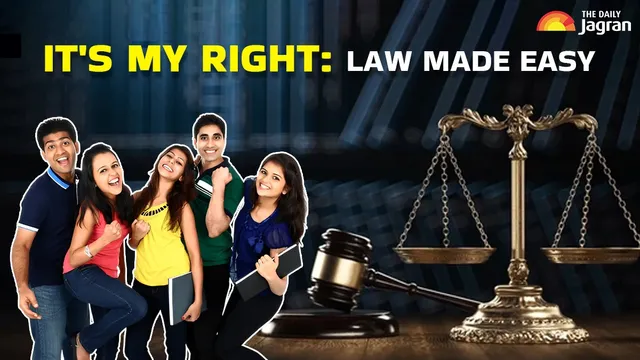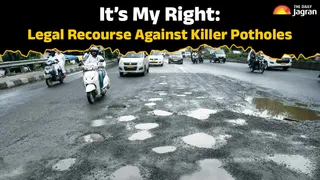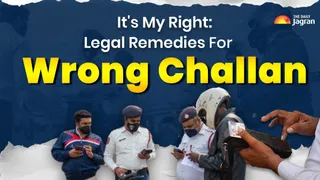- By Raju Kumar
- Thu, 04 Sep 2025 01:21 PM (IST)
- Source:JND
Laws You Should Know: From 'Vote Adhikar' to 'Save The Constitution', such words that emphasise the significance of the legal rights of the citizen often echo in the political circle. But, it does not mean that the subject is only important for politicians or people who remain vigilant about their legal rights. Every common man, especially youth, should know their legal rights. 'Legal rights' may sound heavy, but we cannot afford to ignore them, as we are all governed by these laws.
Every move you make in the house or outside is guided by laws, and breaching them is subject to punishment. Here, I don't suggest that you should have knowledge about the complex legal affairs, but I urge you to know at least the common laws to make your day-to-day life easier. In an attempt to make the readers empowered, The Daily Jagran brought a special campaign - 'It's My Right' - to impart common legal rights that the Constitution gives to every citizen. In the series of articles as a part of the 'It's My Right' campaign, we will inform you about your legal rights, which are useful in your daily life. For example, what will you do if your phone is stolen?
Apart from Constitutional Rights - Right to Equality, Right to Freedom, Right against Exploitation, Right to Freedom of Religion, Right to Education (RTE) and Right to Constitutional Remedies, there are several other legal rights which empower you in day-to-day life.
Recommended For You
What Legal Expert Said About Common Laws
To make it easier, I spoke to Supreme Court Advocate Ashish Chaubey. Appreciating our efforts to enrich readers with information about commonly used laws, he said, often people think law is not their subject, but the reality is that it is useful for everyone. People can sort out many troubles by knowing their legal rights for a specific situation, Chaubey asserted.
ALSO READ: SC Seeks Answers From Govt As Floods, Landslides Ravage Punjab, Himachal Pradesh And Uttarakhand
Here Are Some Highlights Of Conversation With Advocate Ashish Chaubey
- Three new criminal laws came into force from July 1, 2024 - the Indian Justice Code, Indian Evidence Act and Indian Civil Protection Code. The Bharatiya Nagarik Suraksha Sanhita (BNSS) or Indian Justice Code, formerly known as the Indian Penal Code (IPC, 1860), is the main structure of criminal laws in India.
- Right To Private Defence: Mentioned in Section 35 under BNSS, which provides individuals with a legal right to protect their own or another person's body or property from unlawful acts. This right arises from a reasonable apprehension of harm, but it must be exercised with proportionate force.
ALSO READ: Law Minister Launches ‘Media Law and Ethics’ Book, Discussing Media Freedom In AI Era
- Right Against Arrest: Under the BNSS and Article 22 of the Constitution, an arrested person has certain rights, including knowing the grounds of arrest, consulting a lawyer, appearing before a magistrate within 24 hours, having his mental or physical condition examined and having his family and friends informed immediately after the arrest. Section 47 of the BNSS requires the police to state the grounds of offence when arresting without a warrant, and Section 57 prohibits detention for more than 24 hours.
- Right To Consult A Lawyer: If one is arrested by police, he has the right to consult a lawyer to defend themselves. The right to have a lawyer is given under Section 38 in the BNSS, which gives the person the right to consult a lawyer during arrest and at the time of interrogation. Apart from this, if a person is unable to hire a lawyer, then under Section 341, the court will appoint a lawyer for him at the state's expense.
Here Are Some Common Legal Rights That You Should Know
Harassment At Workplace: The BNS, 2023, Section 75 gives a right to file a criminal case for harassment through physical contact, sexual advances, requests for favours, showing pornography, or sexually colored remarks, with punishments of up to three years' rigorous imprisonment or a fine for physical acts. The Sexual Harassment of Women at Workplace (Prevention, Prohibition and Redressal) Act, 2013 (PoSH Act) provides specific civil and administrative remedies for workplace harassment.
Drunk Driving: In case of drunk driving, which causes death, the accused can be charged under Section 106 of the BNS, 2023, which deals with causing death by rash or negligent acts.
Mobile Theft: Two Sections BNS lead with mobile theft. Section 303 BNS for general theft and Section 304 BNS for the specific offence of snatching, which includes the sudden, forcible taking of a mobile phone directly from a person.
Rights Against Being Terminated By Company: The Industrial Disputes Act, 1947, applies to businesses with 100 or more employees. Section 25F provides the employee with one month’s notice or wages equivalent to 15 days for each year of service.
Obscene Messages: Under Section 296 of the Bharatiya Nyaya Sanhita (BNS), performing an obscene act in a public place or singing/reciting obscene songs, ballads, or words in or near a public place to the annoyance of others is a criminal offence. The punishment for this offence can be imprisonment for up to three months, a fine of up to Rs 1,000, or both
Obscene Online Messages: If someone sends you obscene online messages, you can apply your legal right to take action under laws like Section 67 of the Information Technology Act, 2000, and Section 292.
(Disclaimer: This article is part of the series 'It's My Right'. The views expressed in the article are for informational purposes only and do not constitute legal advice. To read more articles in the series, click here )




-1762924998307_m.webp)

